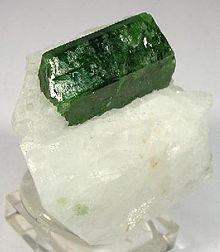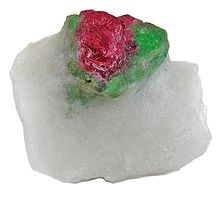Pargasite
| Pargasite | |
|---|---|
 Single crystal of pargasite, 1.5 cm long, on a matrix of white marble from Hunza Valley, Pakistan | |
| General | |
| Category | Inosilicates |
| Formula (repeating unit) | NaCa2(Mg4Al)(Si6Al2)O22(OH)2 |
| IMA symbol | Prg[1] |
| Strunz classification | 9.DE.15 |
| Dana classification | 66.1.3a.12 |
| Crystal system | Monoclinic |
| Crystal class | Prismatic (2/m) (same H-M symbol) |
| Space group | C2/m |
| Identification | |
| Color | Bluish green, grayish black, light brown |
| Crystal habit | Stout prismatic to tabular |
| Twinning | Simple and lamellar – common |
| Cleavage | {110} perfect |
| Fracture | Splintery |
| Mohs scale hardness | 5–6 |
| Luster | Vitreous |
| Diaphaneity | Translucent, will transmit light on thin edges. |
| Specific gravity | 3.04–3.17 |
| Optical properties | Biaxial (−) |
| Refractive index | nα = 1.630 nβ = 1.640 nγ = 1.650 |
| Birefringence | δ = 0.020 max. |
| References | [2][3][4][5][6] |
Pargasite or pargasitic hornblende is a complex inosilicate mineral of the amphibole group with formula NaCa2(Mg4Al)(Si6Al2)O22(OH)2.
It was first described for an occurrence in Pargas, Finland in 1814 and named for the locality.[6]
It occurs in high temperature regional metamorphic rocks and in the skarns within contact aureoles around igneous intrusions. It also occurs in andesite volcanic rocks and altered ultramafic rocks.[3]
Pargasite is the main water-storage site in the uppermost mantle; however, it becomes unstable at depths greater than 90 km (56 mi). This has significant consequences for the water storage capacity, and the solidus temperature of the lherzolite of the upper mantle.[7]
It is used as a gemstone.[8][9]
See also
References
- ^ Warr, L.N. (2021). "IMA–CNMNC approved mineral symbols". Mineralogical Magazine. 85 (3): 291–320. Bibcode:2021MinM...85..291W. doi:10.1180/mgm.2021.43. S2CID 235729616.
- ^ Mineralienatlas
- ^ a b "Pargasite" (PDF). Handbook of Mineralogy (pdf). Mineralogical Society of America. Retrieved 2012-12-17.
- ^ "IMA Master List". Archived from the original on 2015-01-05. Retrieved 2014-05-12.
- ^ "Pargasite". mindat.org. Retrieved 2012-12-17.
- ^ a b "Pargasite Mineral Data". webmineral.com. Retrieved 2012-12-17. (Java plugin required)
- ^ Green, D H; Hibberson, W O; Kovacs, Istvan; Rosenthal, A (23 September 2010). "Water and its influence on the lithosphere–asthenosphere boundary". Nature. 467 (7314): 448–451. Bibcode:2010Natur.467..448G. doi:10.1038/nature09369. PMID 20865000. S2CID 4393352. (subscription required)
- ^ Dedeyne, Roger; Quintens, Evo (2007). Tables of gemstone identification (1st ed.). Gent, Belgium: Glirico. p. 169. ISBN 9789078768012. Retrieved 5 November 2020.
- ^ "Amethyst Crystals and Meaning Healing Properties". nacrystal.com. 2022-07-11. Retrieved 2023-02-10.

